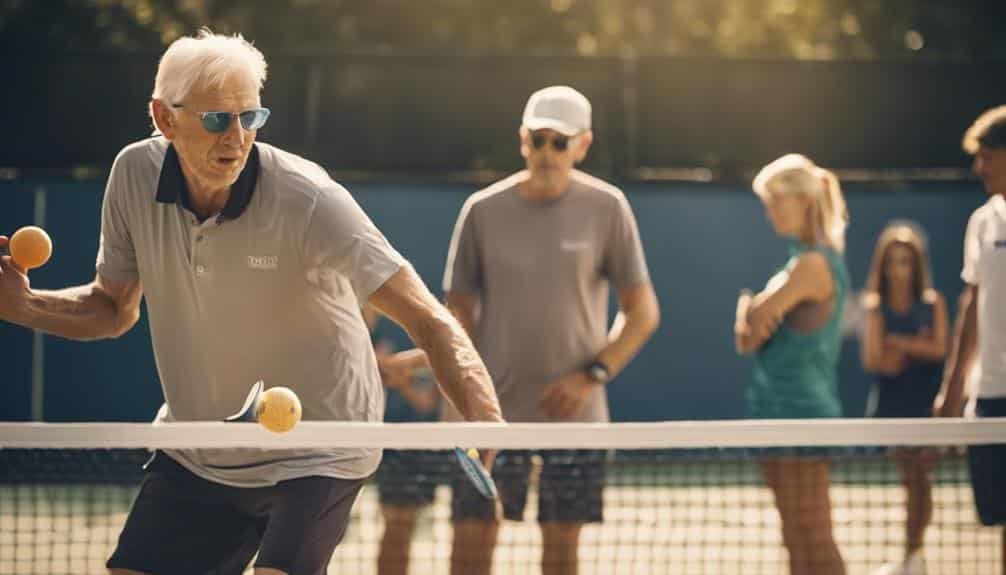Mind games absolutely matter in pickleball victory. I've found that mental toughness can be the deciding factor between winning and losing. It's not just about physical skills; it's about staying focused, confident, and adaptable. I've learned to use positive self-talk, visualization techniques, and effective partner communication to gain a mental edge. Overcoming pre-game anxiety and leveraging timeouts effectively have also been game-changers for me. By building confidence through experience and embracing challenges, I've improved my overall performance. The mental aspect of pickleball is a powerful tool that can elevate your game to new heights. Mastering these mind games could be your key to victory.
Key Takeaways
- Mental preparation and psychological readiness significantly impact tournament performance in pickleball.
- Positive self-talk and visualization techniques boost confidence and reduce pre-game anxiety.
- Effective partner communication in doubles play enhances team dynamics and strategic execution.
- Adapting to unexpected challenges with mental agility is crucial for tournament success.
- Building confidence through experience and pushing beyond comfort zones improves overall gameplay.
Mental Preparation for Tournaments
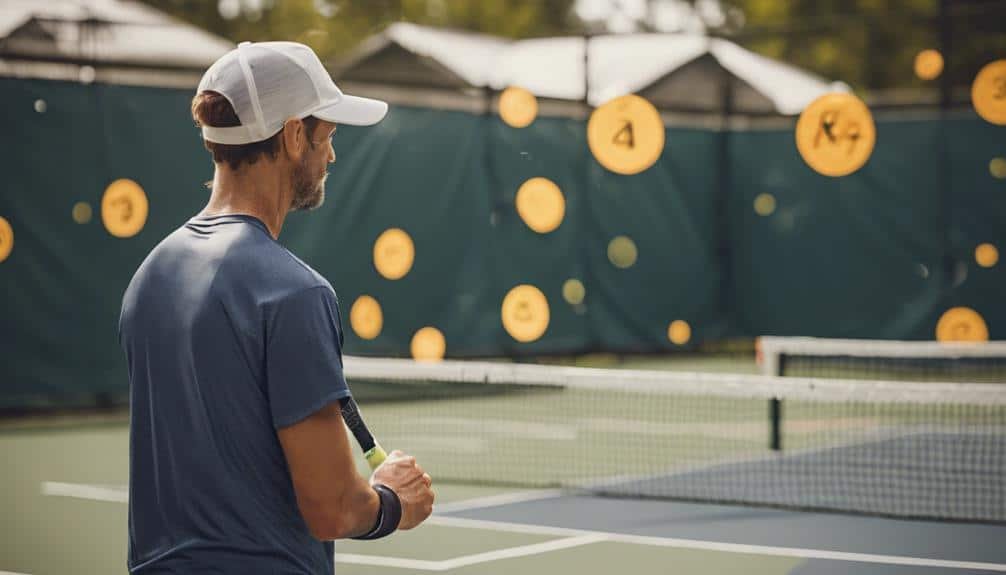
Before stepping onto the pickleball court for a tournament, it's crucial to fortify your mental game, as psychological preparation can make or break your performance.
I've learned that mental rehearsal and visualization techniques are powerful tools in building confidence and reducing anxiety. By imagining myself successfully executing shots and strategizing plays, I'm better equipped to handle the pressures of competition.
To overcome mental barriers, I focus on embracing positivity and encouragement. This mindset shift has been transformative, allowing me to push past my comfort zone and grow as a player.
I've found that managing nerves and pressure is an essential skill, one that I continuously hone through practice and self-reflection.
Overcoming Pre-Game Anxiety
As I've learned through experience, conquering pre-game anxiety is a critical skill that can significantly impact your performance on the pickleball court. Overcoming this mental hurdle requires a mindset reset and fear release.
I've found that acknowledging my nerves and embracing them as a sign of readiness helps me channel that energy positively.
Preparation is key to reducing anxiety. I rely on the Tournament Game Plan course in the Better Pickleball Academy to equip myself with strategies for before, during, and after matches.
This knowledge boosts my confidence and helps me feel more in control.
I've also discovered the power of positive self-talk and visualization. By imagining successful outcomes and reminding myself of past achievements, I can quiet those nagging doubts.
Positive Self-Talk During Matches
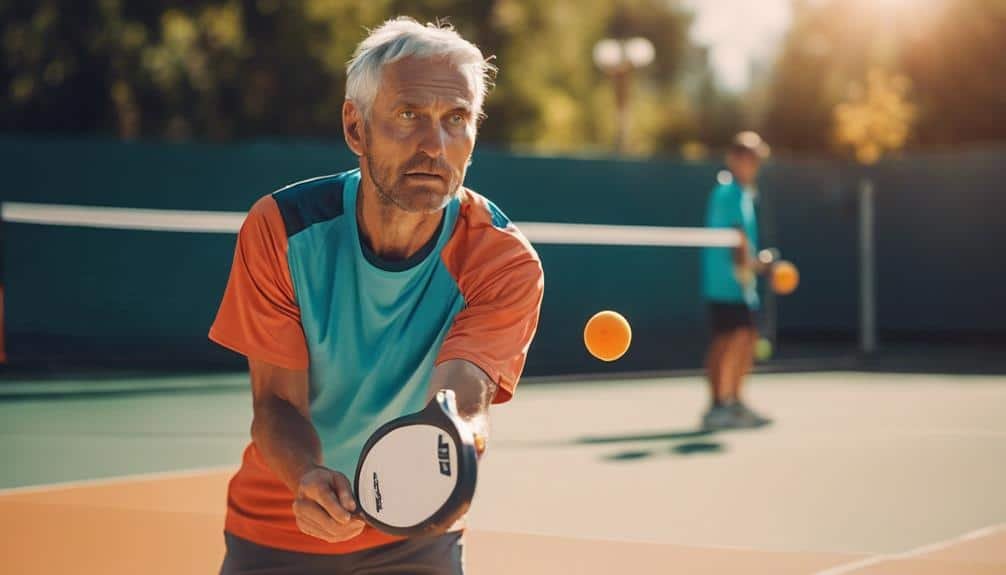
Once you've stepped onto the court, maintaining a positive internal dialogue becomes your secret weapon for peak performance.
I've learned that self-affirmation and personal mantras can significantly impact my game.
- Reframe negative thoughts instantly
- Use empowering language to boost confidence
- Celebrate small victories throughout the game
Partner Communication Strategies
Effective partner communication forms the backbone of successful doubles play in pickleball, enabling seamless coordination and strategic execution on the court.
I've learned that assigning clear partner roles is crucial for maintaining order and efficiency during matches. My partner and I establish who'll take the middle ball and who'll cover the sidelines, reducing confusion and missed shots.
We've also developed a signal system to convey our intentions without alerting our opponents. A simple hand gesture can indicate whether we're stacking or switching positions. These non-verbal cues have become our secret language, strengthening our bond and improving our gameplay.
I've found that regular check-ins between points help us stay connected and motivated. We discuss what's working, what needs adjustment, and offer encouragement. This constant dialogue keeps us united, focused, and ready to tackle any challenge together.
Adapting to Unexpected Challenges
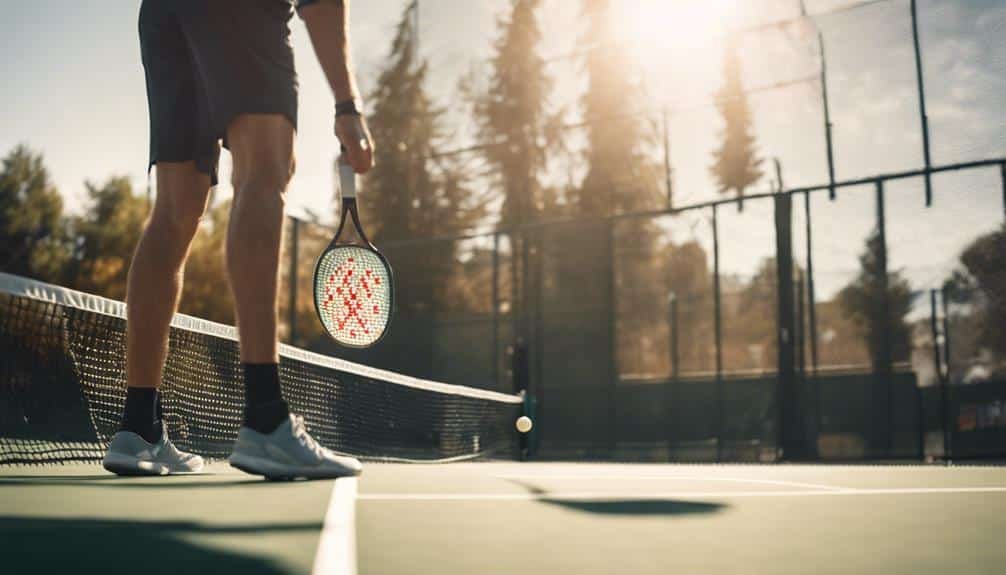
While partner communication is key, I've learned that tournament success hinges on our ability to adapt to unexpected challenges that arise during play.
Developing a flexible tournament mindset is crucial for overcoming obstacles and maintaining peak performance.
- Embrace the unexpected: View challenges as opportunities for growth rather than setbacks.
- Practice mental agility: Quickly assess new situations and adjust your game plan accordingly.
- Stay positive: Use self-talk and visualization to maintain confidence when faced with adversity.
Maintaining Focus Between Games
Between intense matches, I've discovered that maintaining mental focus is just as crucial as physical recovery for tournament success.
My mid-game routines have become my anchor, helping me reset and refocus after each point. I've learned to take deep breaths, visualize successful shots, and mentally rehearse my strategy.
These moments between points are golden opportunities to recenter and recharge.
Developing a strong between-point focus has been a game-changer for me. It's not just about resting physically; it's about mentally preparing for the next challenge.
I've found that staying present and avoiding distractions keeps me in the zone. By treating each point as a fresh start, I'm able to let go of past mistakes and stay confident.
This mental resilience has become my secret weapon in pickleball tournaments, helping me push through fatigue and maintain peak performance.
Leveraging Timeouts Effectively
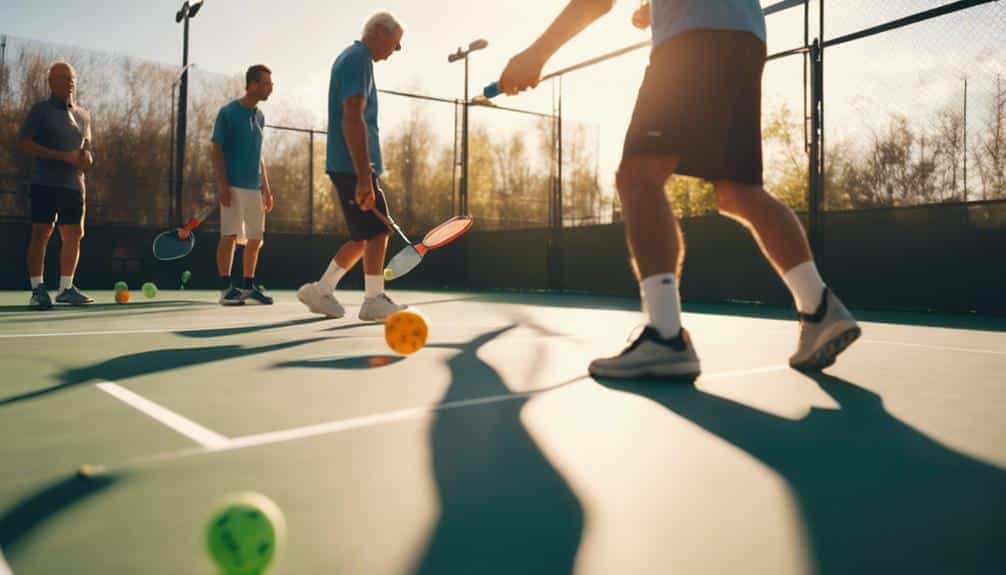
Timeouts in pickleball tournaments are strategic gold, offering a crucial opportunity to reset, regroup, and regain momentum when the pressure's on. I've learned that leveraging timeouts effectively can be a game-changer.
Assess and adjust: Use this pause to evaluate your opponent's strengths and weaknesses, then adapt your game plan accordingly.
Recharge mentally: Take deep breaths, visualize success, and reaffirm positive self-talk to boost your confidence.
Communicate with your partner: Align your strategies and offer mutual encouragement to strengthen your team dynamics.
Age Bracket Mindset Adjustments
Beyond strategic timeouts, I faced an unexpected mental challenge when our age bracket was merged with a younger group, forcing me to quickly adjust my mindset and expectations.
Initially, this change in bracket expectations felt daunting, but I soon realized it was an opportunity for growth. The age dynamics in our new bracket pushed me to reevaluate my self-imposed limitations and embrace a more competitive spirit.
I reminded myself that age is just a number in pickleball, and skill transcends generational boundaries. This shift in perspective allowed me to focus on my strengths rather than perceived weaknesses.
Recovery Techniques for Performance
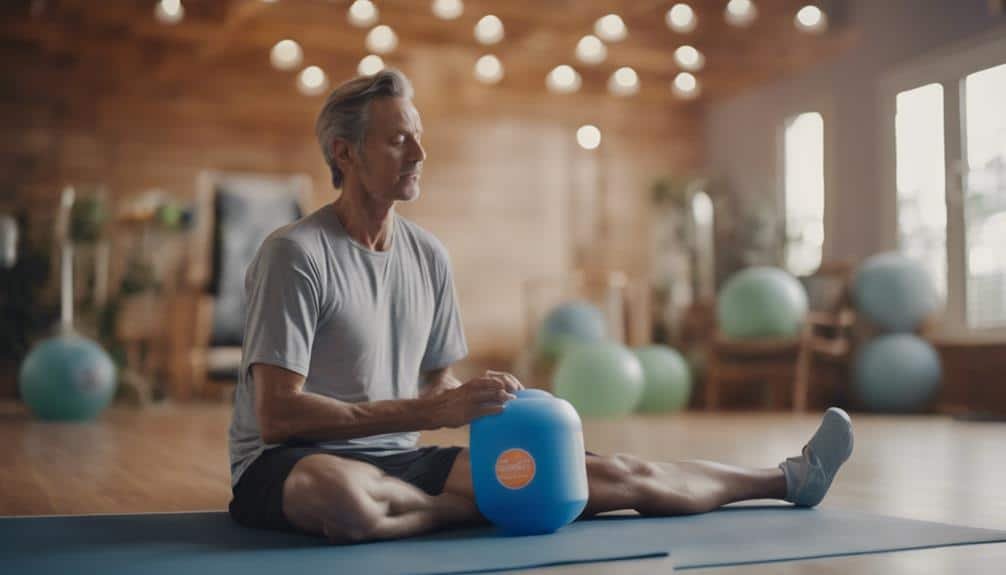
Rest periods between matches proved crucial for maintaining peak performance throughout the tournament, highlighting the importance of effective recovery techniques.
I learned that post-match routines can make or break your next game.
Three key strategies I employed for effective recovery are:
- Immediate cool-down: Gentle stretching and hydration to prevent muscle stiffness
- Mental reset: Brief meditation or visualization to clear my mind
- Physical restoration: Removing shoes and elevating feet to promote blood flow
These techniques helped me recharge and refocus between matches.
I also discovered that sleep strategies play a vital role in tournament success. Prioritizing quality rest the night before and stealing quick power naps during longer breaks kept me alert and energized.
By embracing these recovery methods, I felt more connected to my body and mind, allowing me to perform at my best consistently.
Building Confidence Through Experience
Confidence, the cornerstone of peak performance, flourished with each match I played, transforming my tournament experience from daunting to empowering.
Sport psychology teaches us that self-assurance grows through repeated exposure to challenging situations. As I faced opponents of varying ages and skill levels, I realized that every point, win or lose, contributed to my personal growth.
The merge of age brackets, initially intimidating, became a catalyst for pushing beyond my comfort zone.
I embraced the opportunity to test my skills against a diverse field, fostering a sense of belonging within the pickleball community. With each successful shot and strategic decision, my belief in my abilities strengthened.
This newfound confidence not only improved my gameplay but also enhanced my overall tournament experience, proving that in pickleball, as in life, mind games truly matter.
Conclusion
As I left the NYC Open, I couldn't help but marvel at the coincidence: my biggest challenge had become my greatest teacher.
By embracing mental strategies, I'd unlocked a new level of performance.
The mind games that once intimidated me now fueled my success.
I'm convinced that pickleball victory isn't just about physical prowess; it's about mental resilience.
With this new mindset, I'm ready to conquer any court, any opponent.

